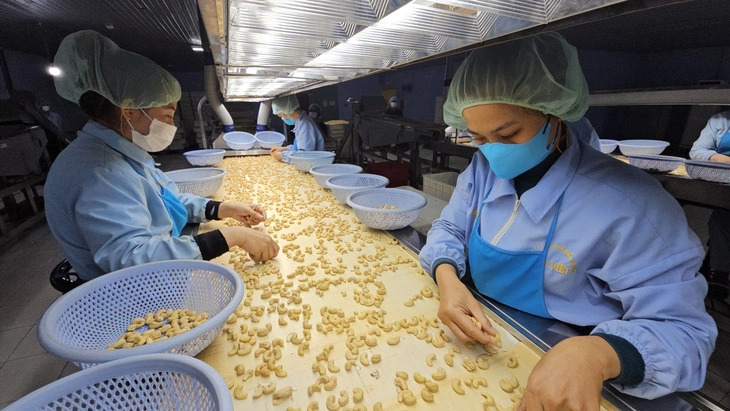Vietnamese cashew kernel exporters face significant losses as many raw cashew nut suppliers in East Africa have either raised their prices or failed to deliver on contracts previously agreed upon at lower prices, the Vietnam Cashew Association (Vinacas) has warned.
At a press briefing on Friday, Nguyen Minh Hoa, vice-president of Vinacas, announced that the prices of raw cashew nuts imported into Vietnam from East Africa have sharply increased to US$1,500-1,700 per metric ton, a 40-50 percent rise from the rates agreed upon in February or March.
In addition to the price hike, many suppliers have failed to honor their contracts, resulting in deliveries that meet only 50 percent of the agreed volumes, Hoa stated.
Many East African suppliers have attributed the price surge and contract non-performance to crop failures in the region and the Ivory Coast's policy of limiting raw cashew nut exports, he explained.
Ta Quang Huyen, general director of Hoang Son 1 JSC in southern Binh Phuoc Province, a leading cashew kernel exporter, remarked that the recent sharp increase in imported raw cashew nut prices is unprecedented.
Huyen noted that many West African suppliers have not only announced price increases but have also halted deliveries under existing contracts, demanding higher prices for the remaining quantities.
For instance, a contract between Hoang Son 1 and a West African supplier specified 53,000 metric tons of raw cashews, but the supplier delivered only about 25,000 metric tons at the agreed contract prices, Huyen stated.
The remaining volume will be subject to a higher price imposed by the supplier or will not be delivered, Huyen lamented.
Similarly, Cao Thuc Uy, director of Cao Phat Co. Ltd. in southern Ba Ria - Vung Tau Province, reported that the number of imported raw cashew nuts has currently reached more than 70 percent of the amount specified in the signed contract.
Uy also noted that the export prices of cashew kernels have increased 30 percent compared to February and March. However, this rate of increase is still less than the price hike of imported raw cashew nuts.
He also pointed out that the quality of raw cashew nuts this year has been much lower than previously.
Vinacas has announced plans to compile a list of foreign suppliers who have failed to meet their contractual obligations and to consider appropriate sanctions or legal action against them in international courts.
Hoa revealed that over 90 percent of the raw cashew nuts used by Vietnamese processors are imported, with 70-75 percent (about 2.3 million metric tons per year) coming from East Africa. In contrast, the domestic supply only reaches about 300,000 metric tons per year.
Due to this heavy reliance on imports, prolonged adverse conditions could lead to significant shortages of input materials for Vietnamese processors and exporters in the third and fourth quarters of this year, resulting in substantial losses from increased import prices. Hoa also warned that these conditions might extend until the first quarter of 2025.
Some businesses forecast a seven-percent decrease in the global supply of raw cashew nuts this year due to adverse weather, though the actual decline might be even greater. This suggests a prolonged shortage of processing materials for export.
In response, many businesses have proposed that Vietnam’s agricultural authorities expand cashew growing areas and implement measures to improve productivity, reducing reliance on imports and minimizing risks related to price fluctuations and material shortages.
Despite these challenges, Vietnam exported about 216,000 metric tons of cashew kernels worth $1.16 billion in the first four months of this year, marking a 32.4 percent increase in volume and a 21.2 percent increase in value year on year, according to the Ministry of Agriculture and Rural Development.
Like us on Facebook or follow us on Twitter to get the latest news about Vietnam!




















































